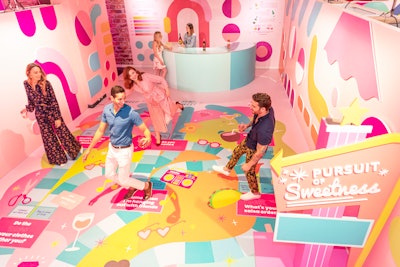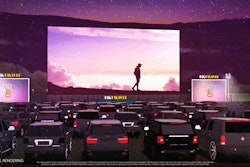
Paige Solomon’s latest adventure, Madcap Motel, was slated to open to the public on Friday, March 13—a fitting date for the kooky, Twilight Zone-esque experience located in Los Angeles’s Arts District.
But then the pandemic hit. “If you ever need to know how to open and close a business in the same 24 hours, I’m your girl!,” Solomon jokes. Centered around the story of a 1940s motel and its owner who mysteriously vanished, Madcap Motel features 19 themed spaces with retro '60s designs that include hidden passageways through which visitors can enter different dimensions. That was the plan, anyway.
 Before the pandemic shut down live events, Madcap Motel had been set to open March 13 in Los Angeles.Photo: Laura Dart
Before the pandemic shut down live events, Madcap Motel had been set to open March 13 in Los Angeles.Photo: Laura Dart
Although Solomon, who serves as Madcap Motel’s CEO and creative director, says the experience “is far more than an ‘Instagram museum,’” she is no stranger to the concept of creating a photo-friendly maze of rooms, having recently built both the Dream Machine and the Nightmare Machine (a modern version of a haunted house) in Brooklyn.
 Dream Machine, which was open in April and May 2018 in Brooklyn, included a ball pit that was designed to make guests feel like they were underwater in a pool.Photo: Taylor McIntyre/BizBash
Dream Machine, which was open in April and May 2018 in Brooklyn, included a ball pit that was designed to make guests feel like they were underwater in a pool.Photo: Taylor McIntyre/BizBash
“I believe that ‘Instagram museums’ were played out before COVID-19 arrived,” says Jack Bedwani, global business director and co-founder of The Projects. “I think that, over the last 18 months, the culture has been shifting away from experiences that lack depth of meaning, and toward experiences that provide people with something Instagram museums do not—a visceral and emotive memory.”
Solomon acknowledges that such interactive experiences will have to change, but she says she believes that they won’t be gone for good. “In a post-COVID world, Madcap Motel will have to adapt some of the interactive touchpoints to ensure guest safety and a certain standard of cleanliness,” she explains. “While myself and my team have been thinking about our own standards and procedures, we will ultimately lean on the local government to understand the necessities and precautions, then adjust accordingly.”
As for possible new public health protocols, Solomon says she thinks “we will see more staff dedicated solely to sanitation. Again, think about a grocery store. When was the last time those carts were cleaned? Now there is dedicated staff that is cleaning each cart between each use.”
In addition to tangible elements, Madcap Motel also incorporates a storyline with live actors, a late add-on that may help it weather the economic climate. “[It was] something we weren’t 100-percent sure people wanted, but now I am so thankful that we pivoted and added more complexity to our experience. Having actors throughout the motel will allow us to keep a level of interactivity, even if some physical touchpoints have to be removed or replaced,” Solomon explains.
 Solomon plans to incorporate COVID-19 into the storyline at the Madcap Motel.Photo: Laura Dart
Solomon plans to incorporate COVID-19 into the storyline at the Madcap Motel.Photo: Laura Dart
Live actors, magic, video components, and sound design help make Madcap Motel a “true immersive environment and less about the picture taking,” Solomon explains. “I am extremely thankful our team pushed the envelope and designed beyond what just looked good in a photograph. It’s going to help us have a head start on the other side of this pandemic when I think a lot of other entertainment venues will be figuring out how to pivot more reactively. Hopefully in a post-COVID world, Madcap Motel will offer the vacation from reality I think we’re all going to need.”
Tyler Balliet, co-founder of Rosé Mansion, says he sees this moment as an opportunity for creativity and that even more experiences might pop up due to the prospective real estate space available, along with people’s need to get out and about. “After this is over, people are going to want to get together with friends and family and do fun things.”
To keep the spirit of Rosé Mansion alive during the shutdown, Balliet and his co-founder Morgan First have been hosting digital events like virtual happy hours via, of course, Instagram. “We throw events, help people come together, and most importantly, have fun! We needed to keep this going, for our team and for our guests. ... When you step in Rosé Mansion, it's almost impossible not to smile. When I go to check on the space even now, it makes me smile every time. We wanted to keep that going even when the mansion is empty.”
Solomon does express concern about the financial effects the pandemic might have on these types of venues though. “At the end of the day, interactive experiences thrive off of seeing thousands of people monthly. Production costs and operating costs are extremely high ($2 million-plus) and so with capacity restrictions alone, a majority of these businesses will be greatly impacted for the foreseeable future and might not be able to make the numbers work in a post-COVID world.”
 At Madcap Motel, visitors can enter different "dimensions" via hidden passageways.Photo: Laura Dart
At Madcap Motel, visitors can enter different "dimensions" via hidden passageways.Photo: Laura Dart
Bedwani echoes that sentiment, saying that “the ball pit gave us the lived experience, but it never gave us the emotion. The feeling you get when you stand in front of a Caravaggio or a Monet for the very first time—an experience that’s slightly different for everyone, yet equally important.”
He also adds that the quest for “likes” and social media status is becoming less important, which in turn may affect the popularity of “Instagram museums.” “I think as we emerge from isolation and begin to dip our toes into what remains of ’normal life,’ people aren’t going to seek out manufactured experiences whose only purpose is to feed ’the gram.’ Instead, we'll be on a quest for reconnection. ... Through social media we'll see what makes each of us different, wonderful, and interesting in our own right. I'm excited for that moment, to see a glimpse of humanity in action.”



















